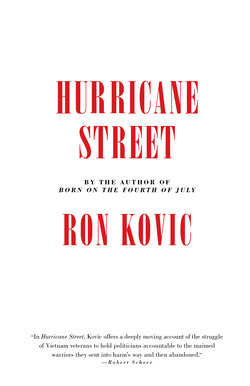Читать книгу Hurricane Street - Ron Kovic - Страница 10
На сайте Литреса книга снята с продажи.
ОглавлениеThe first thing that hits you in this place is the smell. It is a terrible odor of urine and feces, of human bodies all crammed into these depressing little cubicles. There are no private rooms, just these filthy green curtains separating the paralyzed men in their hospital beds. It is like a huge warehouse of human refuse, a storage center for the living dead. There is talk of building a new facility but the funds are just not there. They must all go to the war effort, a war we cannot win, a war where young men continue to die and are maimed for nothing, for a lost cause.
As paralyzed veterans, we all walk a very thin line between being on the outside and stuck in this place. It is not an easy wound to live with. There are the bedsores and the catheters, the urinary tract infections and high fevers, the lack of sexual function, spasms, and terrible insomnia that torments you in the night. Each morning you wake up wondering how you’re going to make it through another day. There is an entire body that does not move or feel from your midchest down and you are constantly lifting yourself up from your cushion in your wheelchair to keep your skin from breaking down. You’re scared and try your best to hide all that you’ve lost, all that you’re going through.
Do the American people, the president, the politicians, senators, and congressmen who sent us to this war have any idea what it really means to lose an arm or a leg, to be paralyzed, or to begin to cope with the psychological wounds of that war? Do they have any concept of the long-term effects of these injuries, how the struggles of the wounded are only now just beginning? How many will die young and never live out their lives because of all the stress and the myriad of problems that come with sending young men into combat?
You struggle to look normal—to fit into this world again after all that has happened to you. It all seems so overwhelming at first, but somehow you find a way to continue on. There are the anxiety attacks and the horrifying nightmares, the depression and thoughts of giving up. You do your best. You’ve got to keep living. You’ve got to keep getting up every morning no matter how crazy it all seems. You’re amazed that you’re still alive, that after all the frustrations and confinement, in and out of bed, fevers, IVs, wetting your pants, soiling the sheets, you are still here, still in this world.
You try to sit proudly in your wheelchair every day, try not to lose your balance. It is incredible how normal a person can look if he only tries. You do your best to get back into life again but you know deep down inside that nothing will ever be the same, that you have lost more than most people could ever imagine, sacrificed more for your country, short of dying, than most of your fellow citizens could ever comprehend.
